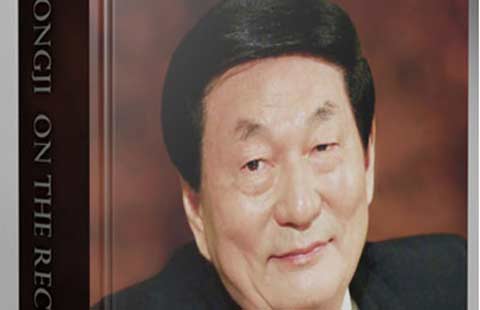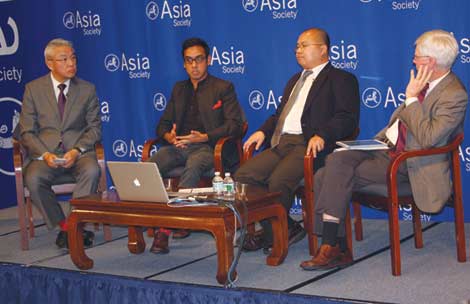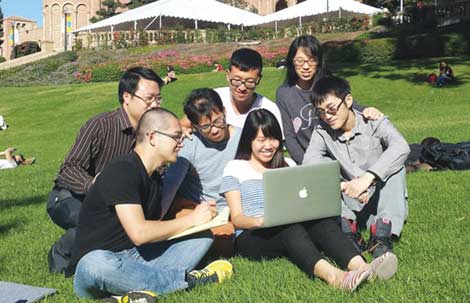US visas hinder talent search: expert
Updated: 2014-10-03 07:00
By AMY HE in New York(China Daily USA)
|
||||||||
 |
|
New York Satish Tripathi, president of the University at Buffalo in New York, giving remarks at a World Education Services' discussion forum on retaining global talent in the US. AMY HE / CHINA DAILY |
 |
|
New York Jean-Christophe Dumont, head of the international migration division at the Organization for Economic Cooperation and Development, giving remarks at a World Education Services' discussion forum on retaining global talent in the US. AMY HE / CHINA DAILY |
Foreign students are often an overlooked group of immigrants in the US, and the country needs to do more to retain the large number of international students that come to America to study, experts said.
In the global economy, the US lags behind other developed countries in retaining its international student population - to which China sends the largest percentage of students, about 30 percent - due to the country's complicated visa system for foreign graduates looking for employment, said Mariam Assefa, CEO of World Education Services (WES).
"There's a bottleneck there," she said. "There are not enough visas to accommodate all the people who would like to stay here, as well as the employers who would like [the students] to stay here."
"So it's very difficult to convert from student to some other visa that would allow you to work. That is why people would like to see immigration reform, to make it easier for people to convert and stay here and work," Assefa said.
Based in New York and Toronto, WES provides credential evaluation for foreign students looking to study at US colleges or work for US employers, and Chinese students make up the majority of the non-profit organization's applicants, Assefa said, speaking with China Daily on Wednesday ahead of an event the WES held in New York on Thursday to discuss what countries like the US need to do to better retain foreign talent.
"China is one of the largest countries that we serve, primarily because China sends the largest number of students to the US, so we see a great deal of Chinese applications," she said.
WES charges students a flat fee of $160 to get their credentials evaluated by the organization, which converts their degrees to an American equivalent so that employers can have a better understanding of what foreign credentials measure up to.
Chinese students, like those from other countries, are faced with the problem of having to compete for a small number of available visas after they graduate, Assefa said.
"Once they have completed their studies in the United States, they are in the same boat and they have to compete for the available numbers and there aren't that many visa numbers, unfortunately," she said.
"This is not a China-specific problem, it goes for everyone. But because we have a large number of Chinese students, you obviously see the numbers reflected across the board - those who graduate and those who complete their studies. China is the largest sender of students - practically 30 percent of the international students in the US are from one single country, China," she added.
Satish Tripathi, president of the University at Buffalo, said during a presentation at the WES event that countries are competing for foreign talent all across the globe and that supply of talent is becoming an "acute" problem.
"It is clear that the talent has become the focus of intense global competition. It is a relatively recent phenomenon that coincides with the emergence for the last 30 years of a global knowledge economy, dependent on highly skilled and creative professionals and business leaders," he said. "This supply problem is becoming more acute with the rapid development of economies in Asia and Latin America, and the globalization of corporate business."
Jean-Christophe Dumont, head of international migration at the Organization for Economic Cooperation and Development (OECD), said that the US is one of only three countries in the OECD that give foreign students no job search period after graduating before they have to obtain work visas, compared to the six, 12, and 24 months that other countries allot.
Some countries provide work visas for foreign talent as long as the student can provide an employment offer or employment letter, which the US could adopt, he said.
"We have to make our process simpler and more transparent," Assefa said. "The other countries make their visa and immigration process easier, and the US is one of the preferred destinations of students, but sometimes our process is very convoluted."
amyhe@chinadailyusa.com
- Xinjiang publishes anti-terror brochures
- Security pact sealed with Afghanistan
- President Xi encourages international cultural exchanges
- Premier Li: China willing to help Afghan infrastructure
- Chinese FM: China, Asia-Pacific become community of shared destiny
- Foreign minister remarks on possibility of China-Japan summit
Most Viewed
Editor's Picks

|

|

|

|

|

|
Today's Top News
VW defends safety of recalled New Sagitar
Former premier makes Hurun philanthropists list
Xinjiang publishes anti-terror brochures
SOHO endows $10m to Yale
Cook and Ma talk about partnership
Language a barrier to healthcare for Asian Americans
China businesses need innovation: VC
Security pact sealed with Afghanistan
US Weekly

|

|















